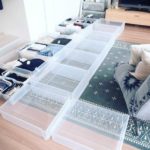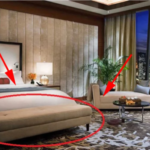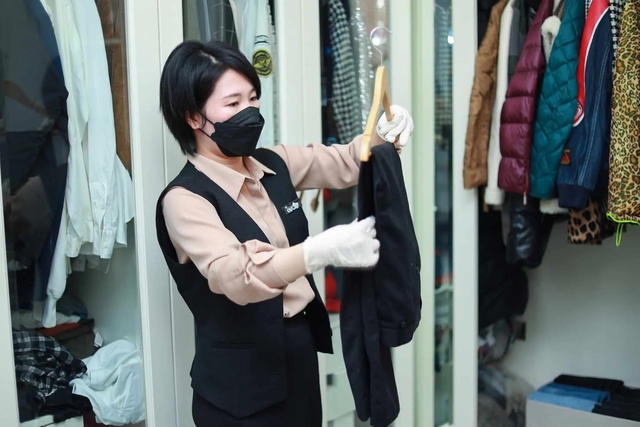
Many households are now organizing their wardrobes for the new season.
As a wardrobe optimization expert, Ms. Hoang Anh, Director of Tudo Ltd., shares some tips to help you quickly achieve a neat and well-organized wardrobe:
1. Build an optimal wardrobe structure:
The ideal wardrobe is an open space. When standing in front of the wardrobe, you should be able to see all the items inside and easily visualize a complete outfit without rummaging through the wardrobe.
To achieve this, hanging clothes is necessary. Prioritize hanging space to occupy about 80% of the total area for easy access and visibility.
+ Horizontal structure (from top to bottom): The top section is for off-season or rarely used items; the middle part is for hanging clothes, and the bottom is for drawers/compartments. There should be a 1.5m high hanging space for long dresses/coats to prevent them from losing their shape. Ceiling-height wardrobes can have two hanging rods installed, one above the other, to maximize hanging space. If the hanging rod is too high, consider installing a pull-down mechanism for easy access without a ladder.
+ Vertical structure (by compartments): When opening any compartment, you should be able to easily put together a complete outfit. For example, if there are shirts hanging above, the bottom should have matching trousers/skirts; if there are t-shirts above, then jeans/shorts should be below.
Allocate a separate compartment for partially worn clothes instead of hanging them behind the door or on an external rack. This compartment can be equipped with UV lights for sterilization and odor removal, or the door can have ventilation holes.
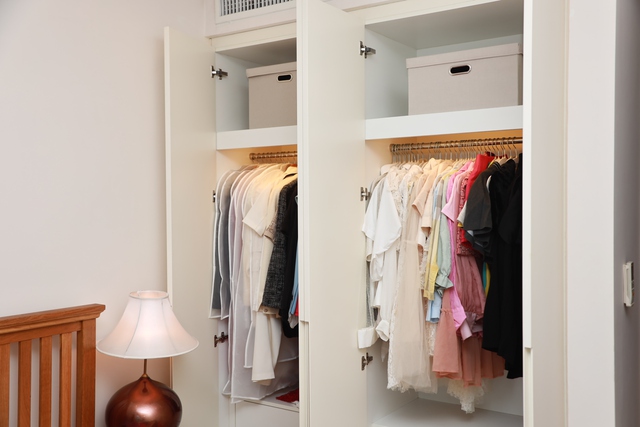
The ideal wardrobe will be an open space. Photo: TG
2. Clear category divisions
When hanging/folding clothes, create distinct categories based on usage habits, and arrange them from large to small items. For instance, within the “pants” category, separate them into long pants and shorts. Further divide long pants into work trousers, jeans for casual wear, etc.
After categorizing and folding the clothes, store each category in separate boxes for easy identification. Always follow the same categories and return the clothes to their designated spots after washing and folding.
3. Establish fixed locations for each category:
It is helpful to create a mental map of your wardrobe. Establish fixed locations for each categorized item. For example, decide which hanging rod, drawer, or compartment is for which type of clothing.
If you can’t remember the locations right away, label each compartment or drawer until you become familiar with the system. Always return the clothes to their designated spots after washing.
4. Regularly declutter the wardrobe
Wardrobe space won’t expand, but the number of clothes will surely increase. Whether you like it or not, regular decluttering is necessary. You can use the 30/60/90 cycle (declutter every 30, 60, or 90 days) or the 1 in – 1 out rule (buy one new item, let go of one old one).
Most women have a hard time letting go of clothes. A trick is to not overthink about donating, selling, or giving away. Simply tell yourself that the wardrobe is too full and you need to move some less-worn items elsewhere to create space. After about three months, you won’t remember those items, and it will be easier to let them go without regret.
5. Cultivate the habit of folding clothes
Different folding methods have their advantages. Some methods are faster, some save more space, and some maintain the shape of the clothes better. What’s important is to maintain the habit of folding clothes regularly; so choose the method that feels most natural and comfortable for you.
If you truly dislike folding clothes, you can simply throw them into the wardrobe, but make sure to sort them and put them into the correct drawers or boxes.
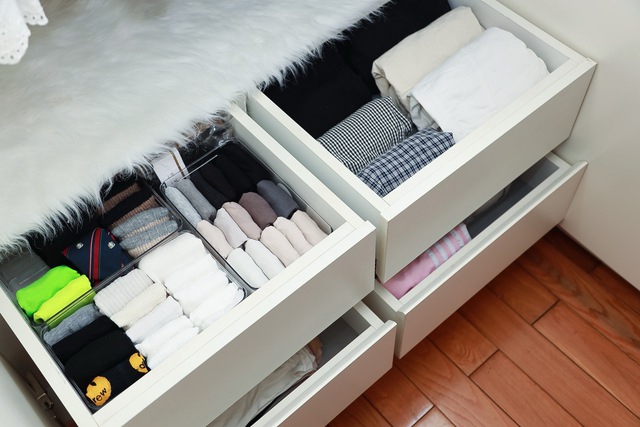
Clothes need to be folded neatly.
6. Pay attention to the choice of storage boxes for vertical clothing arrangement
Women can choose clothing storage boxes made of various materials, as long as they allow for vertical clothing arrangement for easy viewing, access, and retrieval. You can use cardboard boxes, fabric boxes, plastic boxes, or install dividers. Note that thin and delicate items should go into smaller boxes, while bulkier and thicker items can go into larger ones.
7. Optimize a cramped wardrobe and make the most of limited space

According to Ms. Hoang Anh, optimizing a cramped wardrobe will keep it tidy. Photo: TG
Even after decluttering, if your wardrobe still feels cramped, you can try the following tips:
+ If your wardrobe lacks hanging space and has too many drawers, remove the drawer dividers and install a hanging rod to create a hanging section.
+ If the drawers are too high, install a hanging rod to utilize the space for hanging short items like t-shirts, skirts, or shorts. Alternatively, install a shelf divider to split the tall drawer into two smaller ones.
+ Replace bulky, space-consuming hangers with velvet or ultra-thin plastic hangers to maximize the number of items you can hang. Opt for uniform hangers to create a neat and cohesive look.
5 Everyday Chores You’re Doing Wrong Without Realizing It
Introducing the 5 Daily Chores You’ve Been Doing Wrong: A Guide to Optimizing Your Routine
We often get so accustomed to our daily routines that we don’t stop to question if we’re doing things the most efficient or effective way. It’s time to break free from these habitual mistakes and transform your daily chores into a seamless, streamlined routine. From simple solutions to common pitfalls, get ready to discover a whole new world of domestic efficiency.


























